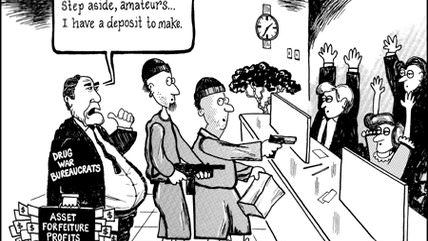Asset Forfeiture Laws 'Evil' and 'Unreformable,' Say Former Justice Department Officials


Last week The Washington Post ran a series of in-depth articles on the problems with civil asset forfeiture. Today, two former justice department officials weighed in on the issue, calling for the abolition of the program they helped create.
John Yoder and Brad Cates were directors of the Justice Department's Asset Forfeiture Office, with a combined tenure running from 1983 to 1989. As they explain, the program started off with good intentions, but has turned to be a cure worse than the disease:
Asset forfeiture was conceived as a way to cut into the profit motive that fuelled rampant drug trafficking by cartels and other criminal enterprises, in order to fight the social evils of drug dealing and abuse. Over time, however, the tactic has turned into an evil itself, with the corruption it engendered among government and law enforcement coming to clearly outweigh any benefits.
Can asset forfeiture be reformed? Yoder and Cates don't think so:
The Asset Forfeiture Reform Act was enacted in 2000 to rein in abuses, but virtually nothing has changed. This is because civil forfeiture is fundamentally at odds with our judicial system and notions of fairness. It is unreformable.
Despite its popularity amongst law enforcement, civil asset forfeiture clearly violates key principles of the U.S. legal system. It reverses the burden of proof, and violates the principle that people are innocent until proven guilty.
This opposition from former government officials who helped implement it is a testament to the harm it causes. It's just a shame that their opposition comes 20 years after their role in its implementation.
For more about civil asset forfeiture, see "How Cops Became Robbers," by Reason's Jacob Sullum.


Show Comments (62)